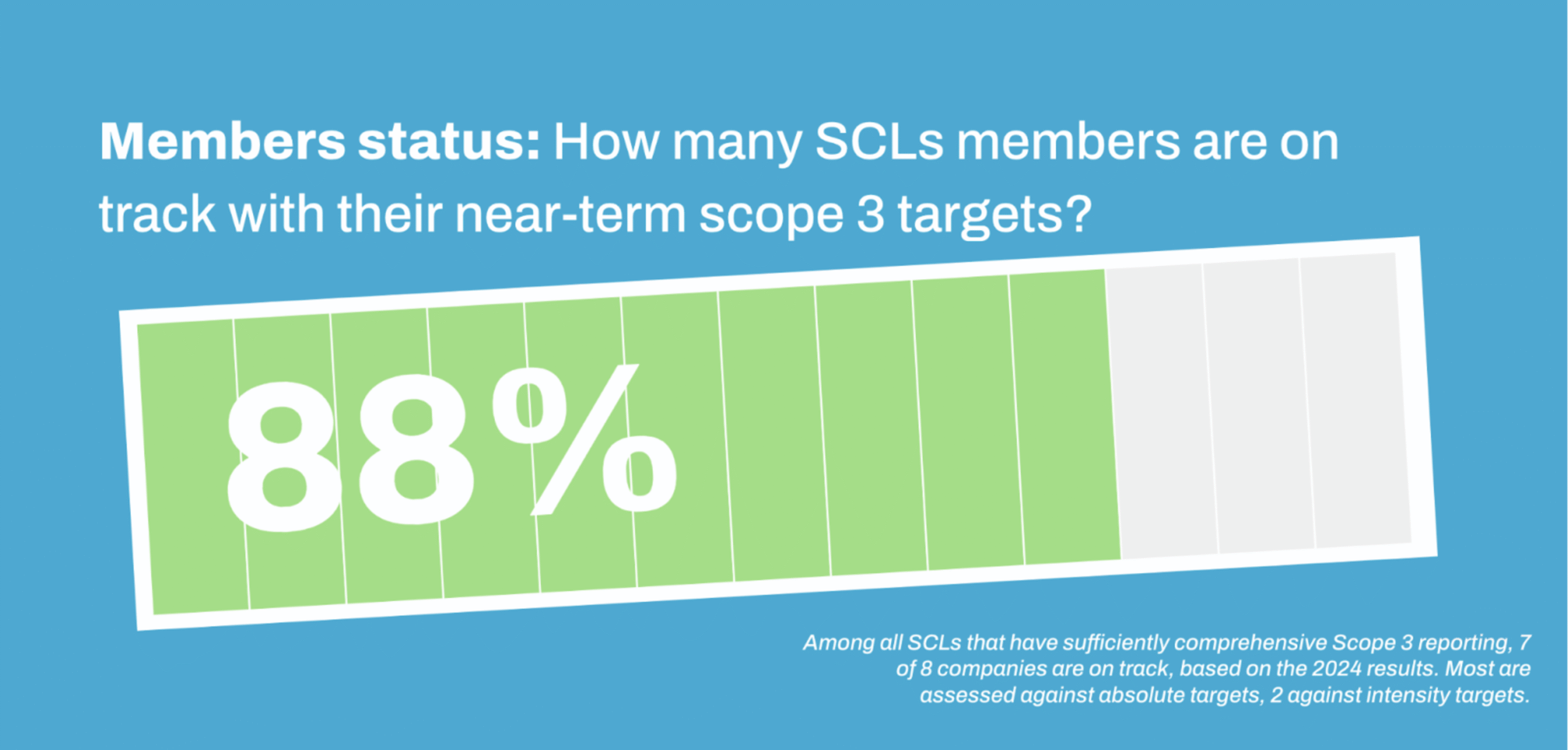88% of assessed members are on track to meet their near-term Scope 3 targets
A new analysis of 2024 data reveals that 88% of companies in the 1.5°C Supply Chain Leaders (SCL) initiative with comprehensive Scope 3 reporting – seven out of eight assessed – are on track to meet their near-term emissions reduction targets. This sends a strong signal from a pioneering coalition of corporate climate leaders that tackling complex supply chain emissions is both possible and underway.
Who are the 1.5°C Supply Chain Leaders?
Convened by the Exponential Roadmap Initiative, the 1.5°C Supply Chain Leaders unite ambitious multinational companies committed to halving emissions across their full value chains by 2030 and reaching net-zero by 2050 – goals aligned with limiting global warming to 1.5°C.
Members include globally recognized companies spanning sectors from technology and telecommunications to retail and food. These leaders are driving climate action beyond their own operations through engaging suppliers, and innovating products and services. By prioritizing Scope 3 emissions – those generated outside a company’s operational boundaries, including suppliers, logistics, and product use – these companies are addressing the largest and most complex part of their carbon footprints and catalyzing broader industry transformation.
Analysis scope and methodology
The 2024 analysis evaluates Scope 3 performance using the latest publicly reported data. Only companies with comprehensive Scope 3 disclosures were included (Apple, BT Group, Ericsson, Inter IKEA Group, Polestar, Scan Global Logistics, Telia Company, and Unilever) ensuring consistency and comparability.
Of the eight companies assessed, six have set targets to cut their total emissions, while two measure progress by how much emissions are reduced per unit of output—for example, per product made or per dollar earned (known as ‘intensity-based’ targets). Progress was assessed against these targets.
Key results and insights
Of the 8 companies assessed, 7 (88%) are on track to meet their near-term Scope 3 targets. Together, these companies achieved a 16.20% reduction in Scope 3 emissions from 2021 to 2024. The result suggests that companies taking leadership roles in supplier engagement and product innovation can make meaningful progress, even within complex global value chains.

What’s driving progress?
The SCL members assessed in this analysis span a wide range of industries—including electronics, telecommunications, retail, automotive and electric vehicles, logistics, and consumer goods. This diversity shows that meaningful progress on Scope 3 emissions is achievable across sectors, especially when bold ambition is backed by concrete action.
Interestingly, the analysis found that Scope 3 performance didn’t strongly depend on when companies set their targets, whether they had a transition plan, or how much experience they had measuring emissions. What seemed to matter more was how much influence companies had over their supply chains, how well they could innovate, and whether they had access to practical, scalable solutions.
This variation in progress suggests that some companies may face structural or contextual barriers that limit their ability to act—such as restricted access to clean technologies, a lack of enabling policy environments, or supply chain partners that are not yet prepared to transition. These challenges are particularly pronounced in certain regions or sectors where broader systemic change is still needed.
Call to action and next steps
Supply chain decarbonization is an important and complex step toward net zero. Scope 3 emissions, largely outside direct control, demand collaboration across suppliers, customers, policymakers, and financiers. Accelerating action requires mobilizing innovation, regulation, financing, and engagement. To support both members and the broader business community, the 1.5°C Supply Chain Leaders initiative will continue to offer decarbonization support to suppliers through ongoing knowledge-sharing activities. The Supply Chain Leaders will continue to identify and explore innovative, company led strategies to accelerate the transition, while also considering how policy can play an enabling role. This work will contribute to scalable solutions and targeted support for companies working to overcome systemic barriers to Scope 3 decarbonization.
Gabrielle Ginér, Head of Environmental Sustainability, BT Group, says:
Decarbonizing value chains is a key component in the race to reaching net zero. These results show that real progress is possible if we act decisively and collaborate. Now is the time to scale solutions and work together to drive system-wide transformation.
Addressing Scope 3 emissions is no longer optional. The 1.5°C Supply Chain Leaders are proving that bold ambition, paired with concrete action, can drive real progress. As the largest and most complex emissions category, Scope 3 requires system-wide transformation—and that transformation begins with leadership.
Stay connected with the 1.5°C Supply Chain Leaders initiative to track progress, learn from emerging best practices, and explore how your organization can contribute. Join us at upcoming events where these leaders will share insights on the challenges and opportunities in transforming global value chains.

